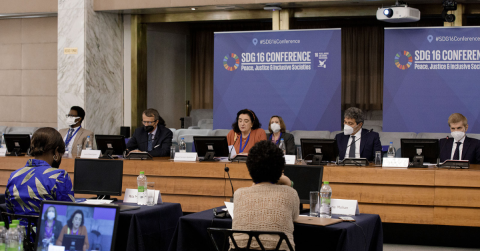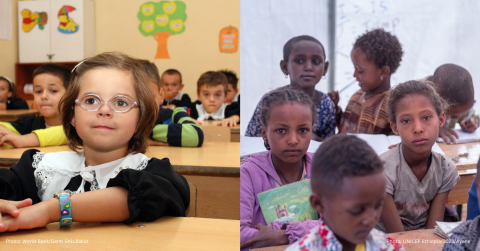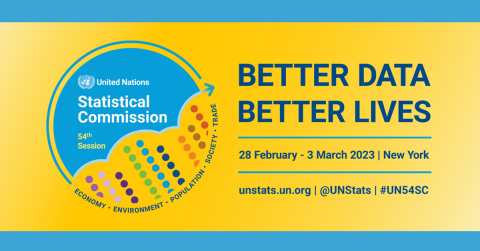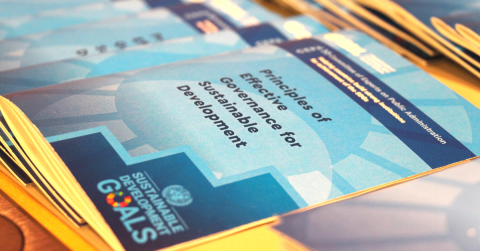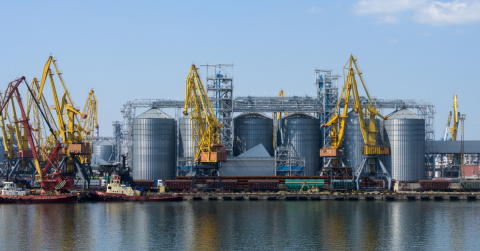Peace, justice and strong institutions: a beacon of hope amid today’s multiple global challenges
Intersecting global crises are posing unprecedented challenges to advancing the 2030 Agenda for Sustainable Development. The causes and effects of these crises – and the actions needed to address them – are interconnected and deeply rooted in issues of human rights, justice, equity, inclusion, accountability, and good governance. Sustainable Development Goal (SDG) 16: Peace, justice and strong institutions encompasses all these issues and can play a vital role in addressing the key challenges that the world is currently facing.
Mid-year update on the global economic situation foresees more uncertainty as policymakers are facing a complex economic context
As we enter May 2023, the global economic situation remains highly uncertain amid an extraordinary confluence of recent shocks that have affected countries across the world. Inflation has remained stubbornly persistent in many countries, directly impacting the lives of the poor, and posing a significant challenge to central bankers around the world.
Access to education for a growing population is key to achieving the SDGs
The role of education in advancing societal progress is well established. Educational achievement impacts people’s lives and supports global efforts to achieve the Sustainable Development Goals. Learning contributes to poverty alleviation, improving health and well-being, promoting gender equality and the empowerment of women, reducing inequalities and achieving environmental sustainability. A well-rounded education equips people of all ages to adopt innovative practices that minimize the harmful environmental impacts of their economic activities.
Partnerships and innovation for better data
The rapid expansion in new sources of data – from national statistics to citizen-generated data and private sector data for public good – are creating large-scale opportunities for new solutions, innovative approaches, and partnerships for better data for a more sustainable future for all.
A rights-based approach to Indigenous issues
The United Nations will welcome hundreds of Indigenous Peoples from around the world for the 22nd session of the UN Permanent Forum on Indigenous Issues (UNPFII) to be held in New York from 17 to 28 April. They will be discussing the most relevant and pressing issues with members of the Permanent Forum, Member States, and UN entities. Here are some key topics to look out for:
Health of the Planet = Health of Peoples
Shaping the future of global statistics
The United Nations Statistical Commission is holding its 54th session from February 28 to March 3, 2023, at the UN headquarters in New York. Established in 1947, the Commission is the apex body responsible for the development of global statistical standards, bringing together chief statisticians from around the world to deliberate on a wide range of important statistical issues, such as data stewardship, data innovation, SDG indicators, social and demographic statistics, economic statistics, and many more topics.
How the planet’s “lungs” contribute to our health and well-being
Forests make our lives better in countless ways. They sustain us – from clean air and water, to food and fuel, to medicines and income. Being near trees helps boost our immune systems, lower blood pressure, reduce stress, and improve mood. When forests are healthy and well-managed they safeguard the health of our planet, by mitigating climate change, protecting biodiversity, and building resilience to natural disasters.
Urgently transforming institutions for a greener, more inclusive, and more resilient world
Five years ago, in July 2018, the UN ECOSOC endorsed the 11 principles of effective governance for sustainable development. These principles were developed by the UN Committee of Experts on Public Administration (CEPA) and focus on three governance pillars: effectiveness, accountability and inclusiveness.
Prioritizing the lives and livelihoods of the most vulnerable through risk-informed development cooperation
The world faces multiple crises involving climate change, economic uncertainty, food shortages and the energy crisis. Development cooperation is crucial during these times of global challenges and uncertainty. It underpins recovery efforts in developing countries, builds resilience and advances progress toward achieving the Sustainable Development Goals.
One year of the war in Ukraine leaves lasting scars on the global economy
One year since Russia’s full-scale invasion of Ukraine, the war’s economic impact still reverberates around the world. The war – while not being the key factor explaining the slower-than-anticipated economic growth in 2022 and downgraded forecasts for 2023 – weighed negatively on global economic activity, adding to inflationary pressures worldwide and impeding the post-pandemic recovery.
 Welcome to the United Nations
Welcome to the United Nations
